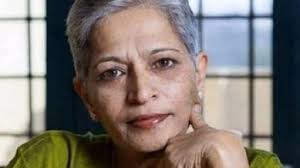Witness in murder of journalist Gauri Lankesh complains of receiving threat call ahead of court appearance

A key witness in the murder trial of journalist Gauri Lankesh recently received a threatening phone call before his court testimony. This alarming incident raises serious concerns about the safety of witnesses in sensitive cases that involve political and ideological motives.
The Gauri Lankesh Murder Case: A Brief Overview
Gauri Lankesh, a senior journalist, was known for her fearless criticism of right-wing extremism. She was shot dead outside her Bengaluru home on September 5, 2017. Her murder shocked the nation and sparked intense debate about press freedom and growing intolerance in India.
The Karnataka Special Investigation Team (SIT) investigated the case. They concluded that the killing was planned and executed by a right-wing extremist group. The SIT charged 17 people, accusing them of conspiracy, murder, and crimes under the Karnataka Control of Organised Crimes Act (KCOCA).
The Threatening Call: What Happened?
The witness, a resident of Belagavi, had rented a house to one of the accused. He later found out that the house was used to plan the murder. He helped investigators identify this property and the people involved.
On May 28, 2025, a day before his testimony, he received a threatening call. The caller warned him not to identify the accused in court. Despite this, the witness appeared the next day and gave his statement. He identified Amit Baddi, Shrikant Pangarkar, and Sharad Kalaskar as visitors to the rented house.
After testifying, the witness filed a written complaint about the threat. The special public prosecutor informed the judge, who recorded the complaint.
Is Intimidation a Pattern?
This case has seen past reports of threats and pressure on witnesses. The political and ideological nature of the murder makes it a high-risk case. Many fear that attempts to obstruct justice might continue.
Legal experts and human rights groups have stressed the need to protect witnesses fully. They say threats must not be ignored, especially in politically charged cases.
Currently, no FIR has been filed about the threat call. This lack of formal action worries many. Experts argue that registering an FIR is crucial. It can lead to a thorough investigation and deter further intimidation. An FIR could also affect the bail status of accused individuals who remain free on bail.
Why This Witness Matters
The witness’s testimony plays a crucial role in the trial. He directly linked the accused to a property used in planning the murder. His statement helped place several suspects at the scene. This firsthand evidence strengthens the prosecution’s case.
Although the witness could not remember one suspect’s name clearly, he confidently identified others. Such eyewitness accounts are vital in trials that rely on circumstantial and forensic evidence.
Reactions from Legal Experts and Activists
Lawyers and activists have condemned the threats. They urge the authorities to act swiftly to protect witnesses.
Kavita Krishnan, a well-known activist, said, “It is disturbing that a witness is threatened before testifying. It shows the fear that still grips those revealing the truth. The state must guarantee witness safety to ensure justice.”
The Karnataka government has claimed to have witness protection protocols. But recent incidents suggest these measures may fall short. The absence of an FIR in this matter has raised doubts about the system’s effectiveness.
The Bigger Fight for Justice
The murder of Gauri Lankesh struck at the heart of free speech and democracy. The trial attracts national and international attention. Many see it as a test of India’s commitment to protecting dissenting voices.
Witness safety is critical not just for this case but for the entire judicial process. Ignoring threats weakens public trust and encourages further violence and intimidation.
Conclusion
The threat against this witness reminds us of the challenges in securing justice. The court and police must act firmly to protect witnesses. Stronger protection laws and quick legal responses to threats are essential.
Justice for Gauri Lankesh depends not only on convictions but also on protecting those who stand up for the truth.






